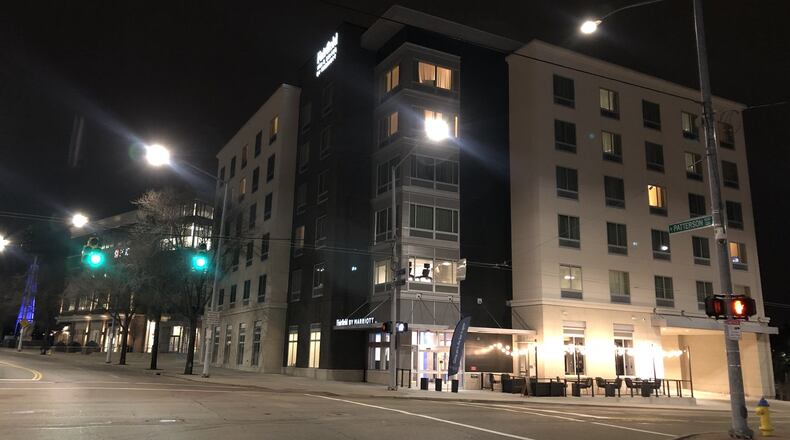Last year, hotels and motels in the Dayton market on average had a more than 64% occupancy rate, Savarise said. But because of COVID-19, some hotels and motels across the state are seeing rates in the low double digits range and even single digits.
“This is going to impact every sector of the economy, but it’s clear that hotel and lodging has been hit worst and first,” Savarise said. “The loss of business our industry is seeing is worse than anything ever in history … there’s nothing to compare this to, even post 9/11.”
MORE: Coronavirus: Senior centers to close Monday; first death confirmed in Ohio
The Dayton market’s 130 to 140 hotels have more than 12,000 rooms. Ohio is home to about 1,500 hotels with about 138,000 rooms, Savarise said.
Normal hotel occupancy rates in the state are the mid-60% range, and at times, they can be 90% or higher, Savarise said.
When hotels’ occupancy rates get into the 10% to 12% range, they have to consider closing temporarily because revenue and expenses are so out of whack, Savarise said, and many businesses are getting close to that point, if they’re not already there.
People are staying home. Vacations have been cancelled. Workers aren’t traveling. Meetings, events and gatherings have been nixed or postponed.
“The impact is massive on the hotel business, both in terms of overnight accommodations but also on the hotels that host meetings, events, banquets and that kind of business,” Savarise said.
Coronavirus: Complete Coverage
The 98-room Fairfield Inn & Suites by Marriott, at 305 E. Monument Ave., opened in late 2018, becoming downtown Dayton's first newly constructed hotel in decades.
The hotel consistently has been full or nearly full, and reservations sometimes often were hard to come by, especially during events and festivals.
But like all other U.S. hotels, the Fairfield Inn has been affected by new coronavirus-related restrictions, especially for business travel, said Brent Crawford, principal and founder of Crawford Hoying, which developed the hotel.
“We continue to take reservations at the hotel, but certainly overall occupancy has been impacted significantly,” he said. “We are hopeful, like everyone, that conditions improve over the coming months.”
Crawford Hoying recently broke ground on a new, 134-room AC Hotel by Marriott on part of the Mendelson’s property in the Water Street District, a short walk from the Fairfield Inn.
Crawford said they are still moving forward with the hotel project but are paying close attention to economic conditions and will make decisions accordingly.
Hotels unfortunately have had to furlough, lay off and shuffle around workers, and job losses will surge if hotels and motels shut down, industry officials say.
This will have a ripple effect on the economy, Savarise said, because hotels directly employ more than 42,000 people and support an additional 192,300 jobs in Ohio through contracts for services, supplies, maintenance, landscaping and construction.
In the short-term, more than half of direct jobs and about 40% of indirect jobs in the industry in Ohio are at risk of being lost, Savarise said, or about 97,180 jobs.
Savarise said he spoke to a Dayton-area hotel management company on Friday that was in the process of laying off between 250 and 300 workers. The group helped its workers apply for unemployment benefits.
People are booking fewer rooms and cancelling bookings, and COVID-19 has led to the cancellation of some major local events, including Hamvention and Winter Guard International, said Jacquelyn Powell, president & CEO-Dayton Convention & Visitors Bureau.
These events pump millions of dollars into the local economy, and Winter Guard alone typically leads to 8,800 hotel room nights in Montgomery County and surrounding counties, Powell said.
“The COVID-19 pandemic has ravaged the tourism industry in Montgomery County,” Powell said. “We are in constant contact with our hotel, attraction and restaurant partners who are all implementing or evaluating layoffs and adjusting operations.”
The Dayton Convention & Visitors Bureau will continue to work aggressively on strategies for recovery and bringing business to the community when the crisis is over, Powell said.
The American Hotel & Lodging Association estimates that about 44% of hotel employees in every U.S. state are projected to lose their jobs in coming weeks.
The hotel industry supports one in 25 U.S. jobs, the national association says, and contributes about $660 billion to the U.S. Gross Domestic Product.
Travel-related job losses alone are expected to be about 3.6 million, resulting in a 6.3% unemployment rate, up from a recent rate of 3.5%, says an analysis by Tourism Economics.
Other sectors of the economy, like retail, are in a better position to rebound, according to industry experts, because even though during the crisis people may hold off on buying consumer goods, cars, homes and other expenditures, when the emergency is over, there could be significant pent up demand.
But hotel rooms that are not sold on a particular night cannot be bought later — they are “perishable” — meaning they cannot be recouped, experts say.
Hotels are essential businesses because they play an important role during emergencies and disaster response because they serve government travelers, first-responders, health care professionals and other workers, Savarise said, and Dayton’s hotels also serve the national security infrastructure because of Wright-Patterson Air Force Base.
If the COVID-19 crisis deepens and more businesses close, some hotels might be willing to be used temporarily as health care-related facilities, possibly for quarantine purposes or to house any overflow of non-infected patients or health care workers, Savarise said.
The American Hotel & Lodging Association is asking for federal funding help and relief in the form of “access to liquidity” and low-interest loans, including for small businesses.
About the Author

